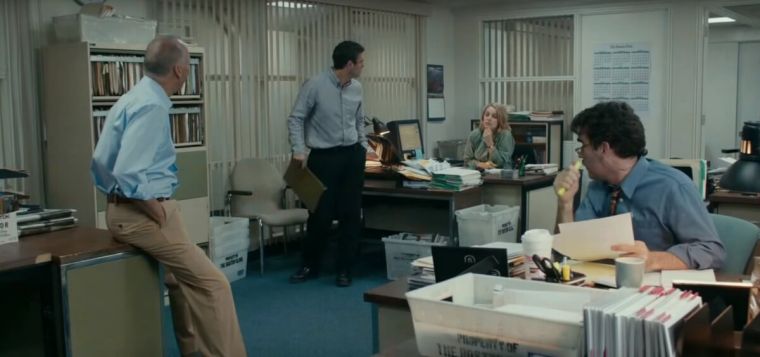Spotlight: a film that the whole church cannot – and must not – ignore

When the King's Speech was released a few years ago, there were reports of audiences breaking into spontaneous applause as the credits rolled. This week, with the release of another Oscar front-runner, Tom McCarthy's Spotlight, I think the general response at that same moment might be rather different. As I left a packed screening, there was no excited chattering or roars of appreciation. We shuffled out in total, shocked silence.
Spotlight tells the true story of a 2002 Boston Globe investigation into systemic child abuse in the Catholic Church. Featuring a starry ensemble cast, it's a truly brilliant film. But it's also a devastating one, because it tells a tragic story about how the most vulnerable people in a society were abused by the very organisation that was meant to support, love and bring justice to them.
Michael Keaton, now re-established as true Hollywood lead, plays Walter "Robby" Robinson, a long-term Globe staffer who heads up the Spotlight team, a group of brilliant investigative journalists who are given time to dig up big stories that matter. When a new editor from outside the city (Liev Schreiber) takes over the newspaper, he asks the team to look into a relatively small 'smoking gun' around a single paedophile priest; a story which has previously been downplayed even in their own newspaper. After some digging, the team realise they're on to a significant scandal, but its scope and shape continues to shift and widen. Before long, Spotlight aren't just pointing a finger at a single priest, but at a number, and then at an entire institution. The question is; can they get the story to stand up in a city where it seems like everyone wants to look the other way?
Horrifically then, this becomes a story of institutionalised a child abuse, not just perpetrated within the church but a legitimised by a whole city. The church, the police, the justice system and even the media become implicated as the rabbit-hole goes deeper. As the always excellent Stanley Tucci's character comments at one point: "They say it takes a village to raise a child... It takes a village to abuse a child too."
As a Christian it's a tough watch; for a Catholic I assume it's even tougher. As the victims begin to describe their terrible experiences, sometimes in necessarily graphic detail, the film explores how paedophile priests were able to flourish in the most deprived areas of a mainly Catholic city; poor kids from poor families were trapped between confusion at the priest's attention and the desire to do the right and faithful thing. For many, robbed of a father or mother and growing up in poverty, it was like God himself was showing an interest. "How do you say no to God?" one victim asks.
The film isn't mean-spirited towards faith itself; it doesn't seem to have an agenda in this regard. Feeling sick to my stomach about the implications for the Christian Church, I was thankful for the moment where one victim takes time to separate religion and men from God, drawing a distinction between his abusers and the God he still follows. Not surprisingly though, others want nothing to do with the God or the church that they feel betrayed them, unable to reconcile the two. "He took my faith", says another man.
From a Christian perspective, Spotlight is perhaps the most important film for many years. The story raises serious questions about the potential for religious institutions in general to become corrupted, and even about how the Christian faith can become subverted for evil means. The figure people will take away from the film is 6 per cent – a suggestion that one researcher character makes about the percentage of priests who could be paedophiles. For the many people who've never really engaged with the scale of the abuse scandal before, the setting of this statistic in a piece of mass-market True Story media will raise all kinds of questions. We might need to think about the right way to answer them.
It's important in this not to forget that Spotlight is a really tremendous piece of film-making. Mark Ruffalo is electric as the key journalist who gets the best speech in the film and might just grab an Oscar with it, while director McCarthy takes a difficult story featuring lots of people talking in rooms and turns it into a pacy, exhilarating quest for justice. The film presents a sort of West Wing version of the press at its very best; scrutinising evil and exposing secrets and lies.
And that's the other, more positive reading of the movie from a Christian perspective. In the end the team who bring justice, if not redemption, to the victims are a group of God-fearing people like occasional churchgoer Rachel McAdams and self-confessed prodigal Ruffalo, who always thought he'd probably go back to the faith one day. While the priests and even parts of the Church might have been corrupt, God isn't.
Tragically though, that brokenness is worse even than the story of Boston reveals. In the final frames, we look on in horror as silent text reveals the worldwide scope of the still-unfolding abuse scandal in the Catholic Church. It's a difficult reminder that while some battles have been won, the war against abuse within the Christian Church almost certainly isn't over. There are still serious questions about how a beautiful faith that centres on love, kindness and justice can be corrupted so completely, and I think we should be thankful to this superb film for raising them once more. It's the front-runner for the Best Picture. I've seen the competition; through tears, Spotlight gets my vote.
Martin Saunders is a Contributing Editor for Christian Today and the Deputy CEO of Youthscape. You can follow him on Twitter: @martinsaunders











